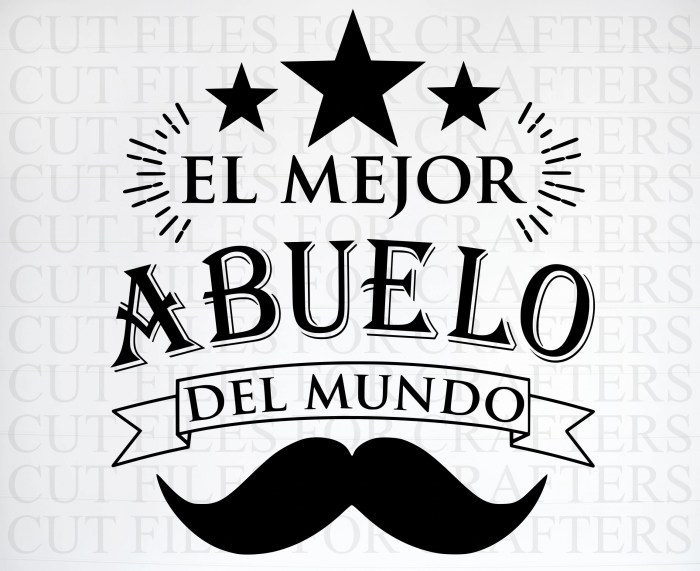Delving into the intriguing world of family connections, we embark on an exploration of el papá de mi abuelo es mi. This genealogical bond, often referred to as great-grandfather or paternal grandfather, weaves a tapestry of cultural, societal, and personal threads that shape our understanding of family dynamics.
From the intricacies of naming conventions to the evolving roles of great-grandparents, we unravel the complexities of this relationship, examining its historical context, emotional significance, and legal implications.
Defining the Relationship

The speaker’s grandfather’s father is their great-grandfather, specifically their paternal great-grandfather since the relationship is through the father’s side of the family.
Terms Used
- Great-grandfather:The father of a person’s grandfather.
- Paternal great-grandfather:The father of a person’s paternal grandfather.
Cultural and Societal Perspectives

Cultural variations in naming conventions and family structures can influence the relationship between great-grandparents and their descendants. In some cultures, naming conventions may reflect the importance of lineage, with children named after their great-grandparents to honor their ancestors. This practice reinforces the connection between generations and emphasizes the continuity of family history.In
societies with extended family structures, great-grandparents often play an active role in raising and caring for their grandchildren and great-grandchildren. They may provide childcare, share cultural traditions, and offer guidance and support. This close-knit family structure fosters a strong bond between generations and allows great-grandparents to have a significant impact on the lives of their descendants.
Societal Norms and Expectations
Societal norms and expectations regarding the role of great-grandparents vary across cultures. In some societies, great-grandparents are highly respected and revered, while in others, they may have a more limited role. In cultures that value tradition and respect for elders, great-grandparents are often seen as a source of wisdom and experience.
They may be consulted for advice, guidance, and support on important family matters. In contrast, in societies where individualism and youth are emphasized, the role of great-grandparents may be less significant.
El papá de mi abuelo es mi bisabuelo, el papá de mi papá. Los bisabuelos son personas muy importantes en nuestras vidas, y deberíamos estar agradecidos por ellos. Sin ellos, no estaríamos aquí. Hay muchas cosas que podemos aprender de nuestros bisabuelos, como Pi Kappa Phi UT Austin , que es una fraternidad en la Universidad de Texas en Austin.
Es importante aprender sobre la historia de nuestra familia y de dónde venimos. Nuestros bisabuelos pueden ayudarnos a conectarnos con nuestro pasado y a comprender quiénes somos.
Historical Context

The concept of family structure and kinship terminology has undergone significant evolution throughout history. In ancient societies, family structures were largely patriarchal, with extended families being the norm. Kinship terms were often used to denote not only biological relationships but also social and political connections.
As societies became more complex, so did family structures. The rise of nuclear families and the decline of extended families led to a shift in the perception of kinship terms. In modern societies, kinship terms are primarily used to denote biological relationships, although cultural and societal factors can still influence their usage.
Societal Changes and Cultural Shifts
Societal changes and cultural shifts have had a profound impact on the perception of the relationship between a grandfather’s father and his grandchild. In traditional societies, this relationship was often seen as one of great respect and authority. The grandfather’s father was typically the patriarch of the family and held a position of power and influence.
As societies became more egalitarian, the authority of the grandfather’s father diminished, and the relationship between him and his grandchild became more one of affection and companionship.
Cultural shifts have also played a role in shaping the perception of this relationship. In some cultures, the grandfather’s father is seen as a source of wisdom and knowledge. In other cultures, he is seen as a symbol of tradition and continuity.
These cultural perceptions can influence the way that grandchildren interact with their grandfather’s father and the level of respect that they show him.
Emotional and Psychological Aspects

Great-grandparents and their descendants often share a special bond that transcends generations. These relationships can provide emotional support, a sense of belonging, and a connection to the past.
For children, having a great-grandfather can be a significant influence in their lives. They may learn about family history, traditions, and values from their great-grandfather. This can help them develop a strong sense of identity and connection to their family.
Emotional Bonds, El papá de mi abuelo es mi
The emotional bonds between great-grandparents and their descendants can be strong and lasting. These bonds are often based on love, respect, and admiration. Great-grandparents can provide their descendants with a sense of security and stability. They can also be a source of wisdom and guidance.
Psychological Implications
Having a great-grandfather as a significant figure in one’s life can have a number of psychological implications. These implications can be both positive and negative.
- Positive implications include a sense of belonging, security, and stability. Great-grandparents can also provide their descendants with a sense of purpose and meaning in life.
- Negative implications can include feelings of guilt, shame, or inadequacy. These feelings can be caused by the great-grandfather’s high expectations or by the descendant’s own feelings of not being able to live up to those expectations.
Legal and Practical Considerations

When a person’s grandfather has a child, the relationship between the new child and the person’s grandfather becomes legally and practically complex. There are potential implications related to inheritance, guardianship, and the role of great-grandparents in providing support and care for their descendants.
Inheritance
In many jurisdictions, laws governing inheritance prioritize blood relations. This means that if a person’s grandfather passes away without a will, the new child may be entitled to a portion of the estate, alongside the person’s father and other close relatives.
The specific distribution of assets will depend on the laws of the jurisdiction and the circumstances of the case.
Guardianship
If a person’s father is unable or unwilling to care for the new child, the grandfather may have legal standing to seek guardianship. This could involve assuming responsibility for the child’s upbringing, education, and well-being. The courts will consider the best interests of the child when making a decision about guardianship.
Support and Care
Great-grandparents can play a significant role in providing support and care for their descendants. They may offer financial assistance, childcare, or emotional support to the new child and their parents. In some cases, great-grandparents may even assume a primary caregiving role if the parents are unable to provide adequate care.
Common Queries: El Papá De Mi Abuelo Es Mi
What is the genealogical term for el papá de mi abuelo?
Great-grandfather or paternal grandfather
How do cultural variations influence the perception of this relationship?
Naming conventions, family structures, and societal norms shape the significance and role of great-grandparents in different cultures.
What are the legal implications associated with this relationship?
Inheritance, guardianship, and support obligations may be relevant legal considerations.